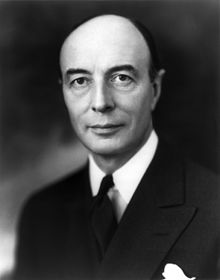Robert A. Lovett | |
|---|---|
 Lovett in 1943 | |
| 4th United States Secretary of Defense | |
| In office September 17, 1951 – January 20, 1953 | |
| President | Harry S. Truman |
| Preceded by | George Marshall |
| Succeeded by | Charles Erwin Wilson |
| 2nd United States Deputy Secretary of Defense | |
| In office October 4, 1950 – September 16, 1951 | |
| President | Harry S. Truman |
| Secretary | George Marshall |
| Preceded by | Stephen Early |
| Succeeded by | Roger M. Kyes (1953) |
| 15th United States Under Secretary of State | |
| In office July 1, 1947 – January 20, 1949 | |
| President | Harry S. Truman |
| Secretary | George Marshall |
| Preceded by | Dean Acheson |
| Succeeded by | James E. Webb |
| Personal details | |
| Born | Robert Abercrombie Lovett September 14, 1895 Huntsville, Texas, U.S. |
| Died | May 7, 1986 (aged 90) Locust Valley, New York, U.S. |
| Resting place | Locust Valley Cemetery, Locust Valley, New York, U.S. |
| Political party | Republican[1] |
| Spouse | Adele Quartley Brown |
| Children | 2 |
| Relatives | Robert S. Lovett (father) |
| Education | Yale University (BA) Harvard University |
| Military service | |
| Allegiance | |
| Branch/service | |
| Years of service | 1918–1919 |
| Rank | Lieutenant Commander |
| Battles/wars | World War I |
Robert Abercrombie Lovett (September 14, 1895 – May 7, 1986) was an American politician who served as the fourth United States Secretary of Defense, having been promoted to this position from Deputy Secretary of Defense. He served in the cabinet of President Harry S. Truman from 1951 to 1953 and in this capacity, directed the Korean War.[2] As Under Secretary of State, he handled most of the tasks of the State Department while George C. Marshall was secretary.
Lovett was a core member of the group of foreign policy elders known as "The Wise Men", and was deemed an "architect of the cold war" by social scientist G. William Domhoff, in his 1970 book, The Higher Circles: The Governing Class in America.[3]
- ^ "Oral History Interview with Robert A. Lovett". Harry S. Truman Library and Museum.
Here I am a registered Republican voting independent, which in my case, meant I was voting the Democratic ticket always -- not because I was a Democrat but because I thought they had either better men or a better idea of what was going on.
- ^ "Robert A. Lovett - Harry S. Truman Administration". Office of the Secretary of Defense - Historical Office.
- ^ Domhoff, G.W. The Higher Circles: The Governing Class in America; Random House; New York; 1970, page 252.